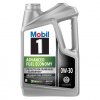There's no real argument for one over the other unless you're starting a vehicle in temperatures around-30F or colder. At those temps the 0W-20 has a slight advantage by being able to resist becoming too thick to be pumped by the oil pump or allowing the engine to turn over. If you look at the M1 EP data sheet I linked to earlier you'll notice that at 100C (212F) the 0W-20 has a KV of 8.6 cSt while the 5W-20 is 9 cSt, a difference so small that the engine will never know a difference. Plus, those are averages so one batch may be a bit thicker or thinner than a different batch.
What's really interesting is the KV at 40C (104F). The M1 EP 0W-20 is 55 cSt, while the 5W-20 is 50 cSt, so if you live in a hot climate the 0W-20 is actually a little thicker than the 5W-20 is if you start the vehicle when the ambient temp is around 100F, and both are still around 6-7 times thicker than what they are at operating temperature. The KV at 40C is basically identical when comparing 0W-20 to 5W-20 oils on the various oil company data sheets. Valvoline Advanced Full Synthetic shows 44 cSt vs 45 cSt and Pennzoil Platinum is 43.4 cSt vs 45.9 cSt. So much for 0W-20 being "water thin" in hot climates.












